
Around six months ago I was made aware of a challenge. Now I love a challenge, especially one regarding football. But this one was formed on such a wonderful cause I could do nothing but throw my small website weight behind it. The idea? To visit every European Cup (and Champions League) winner in a week and meet a “medal winner”. The cause? Well, Robin Blacklock, the man behind the plan can explain it better than I ever can.
The EuroChampsChallenge was a fantastic idea, when was the “lightbulb” moment?
There wasn’t so much of a ‘lightbulb’ moment, but there were two significant points. The initial idea came to me in July 2005. We were driving back through northern France after a family holiday that we nearly didn’t make because of Angus’ ongoing medical needs. I felt that I wanted to do something in recognition of the care Angus had received. I wanted to do something different, something significant and something that hadn’t been done before. “I could drive somewhere” I thought. The 92 English clubs had been done, so I thought “I could do Europe… I could visit European clubs… I could visit the European Cup winners” I then researched it, figured it out, and knew that it was possible. I lived with this for 5 years. Will I/ Won’t I…
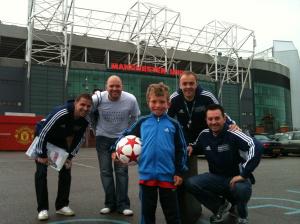
Explain what the concept was?
It was simple, really. We set ourselves the target to visit the ground – by car – of each of the 21 clubs ever to have won the European Cup (and latterly the Champions League) within two weeks, finishing at Wembley on the day of the 2011 Champions League final. A 7,000 mile journey during which we would need to cover and average of 500 miles a day. In addition, we needed to meet a cup winner – a ‘Medallion Man’ from each club.
Did you research to see if anyone else had attempted it?
Not specifically – I mean, how do you? I think we would have found out early on if it had already been done, but to the best of our knowledge, it has never been done before.
What “rules” did you impose on yourself?
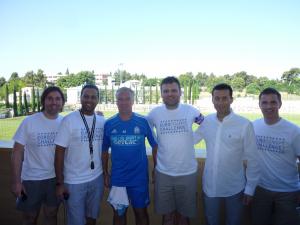
Explain how you went about organising it?
Well, you start with a mind-blowing and quite intimidating list of tasks – sponsorship, publicity and promotion, clubs, medallion men, partners, accommodation, car, travel, putting a team together, building a website… I could go on. So you look at everything needing done and you categorise it. Firstly, I put a team together. Most of the guys had heard my pub chat about this in the past, but I’m not sure any of them properly believed me when I said I was going to do it for real. Once they saw that I really meant it, it took no persuasion.
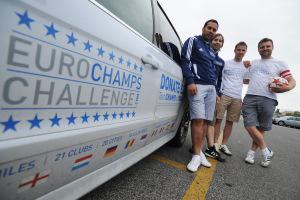
We started with the UK clubs, and in particular those where we might have an ‘in’. With the sponsors we needed – both financial and to provide logistical and functional support – we concentrated on the latter and started with the main Champions Leagues sponsors.
It took time, but by late 2010 we had signed up 3 or 4 of the UK clubs and adidas committed to provide attire and helpe with access to a number of clubs; Sony provided equipment; Mastercard latterly provided auction prizes; and Ford – after an understandably lengthy process – agreed to provide a brand new top of the range S-Max for the trip. We also made one of our most important signings – persuading The BIG Partnership to provide PR support pro-bono.
We then publicised what we were doing through friends and colleagues, and also by an assault on Twitter; this ultimately proved to be very rewarding, but was very hard work too. By the end of the year we had built a story and had real credibility, so then set about trying to secure the continental clubs and really raising the profile.
Simplistically, we put in place a strategy that was rigid enough to base our plan on, but dynamic enough to alter and change according to circumstances.
Which clubs were a dream to deal with?
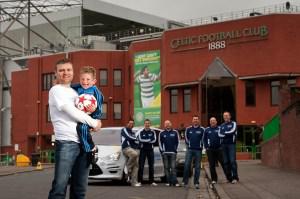
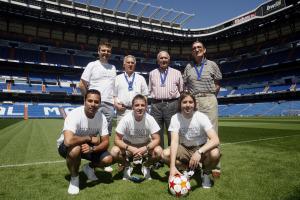
And the ones where there were problems?
I wouldn’t do Liverpool a dis-service because they really did try to help us out, but the problem there was that we arrived at Anfield less than 2 hours ahead of their last home match of the season with Spurs, and with all that happens on a match-day that wasn’t easy – but with a little help from the club, and with Alan Kennedy being a top man, we managed it.
The only real disappointment was Juventus. They were difficult to get on-board to start with, and the club never responded to any of our official requests. Through adidas and a helpful Twitter contact, we did line up a couple of Medallion Men, but due to circumstances they fell away only three days before we were due in Turin. As it was, we arrived at the club’s offices in the town to collect a Del Piero signed shirt which had been left for us, and we did manage to get into the boardroom for a couple of pics of their trophies. But at the same time we were asked to remove their club crest from our website, due to ‘copyright and brand issues’, which left us a little dejected. We did however meet Didier Deschamps at Marseille a day later, so despite the disappointment with the club, we still got our Medallion Man.
All told, to have only one club out of the 21 not really ‘getting it’ I actually think was a great result for us.
Did you feel like royalty on occasions?
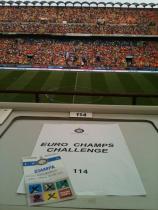
At what point did you think you were living the football dream?
Day 1 was a novelty, but as early as day 2 it really struck us. At Old Trafford we were waiting in the reception area for Alex Stepney, when a couple of supporters walked in. We didn’t hear the full discussion with the security guard, but his last line was “No, sorry, you can’t. These guys [gesturing in our direction] are guests of the club” For a moment I glanced behind us before I realised he was talking about us. Later that day, we stood pitch-side with Des Bremner at Villa Park, before then interviewing him sat in the front of the stand – that felt, looked and sounded like something out of Football Focus!
Whose help was vital on the trip?
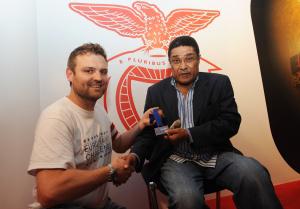
Was there a moment on the adventure when you thought this isn’t going to happen?
There were any number knocks during the organisation that cast doubt, but these just made us more determined. Once we got on the road, we had our first wobble when we found out Gerd Muller could make our scheduled meeting at less than a day’s notice, but the real test came around 2am at the Romanian – Serbian border crossing. We’d been on the road since 6am and encountered the most difficult and challenging driving conditions of the trip. We arrived at the border crossing only to be told by the abrupt Serbian border guards that we didn’t have the correct paperwork; as a result our border crossing was delayed by something like 8 hours. For most of this time we were hitting brick wall after brick wall. As the obstacles increased it really did feel like the end of the trip. Spoon, Jamie and in particular Stuart tried to bring some pragmatism into things by suggesting that we could go round Serbia and still complete the trip – and while that was possible, for me that would have been failure.
The darkest moment on the trip?
The Serbian border crossing at 2am was dark on a number of different levels.
The best moment on the trip?
Impossible to pick one. So many different experiences that meant so much to us. In retrospect, I suppose the most satisfying point was getting into Serbia. That didn’t happen through guile or ingenuity or any intelligent initiative. We got through the border because we managed to get news of our problems to the officials at Red Star Belgrade, and they called in favours with the border police. That only happened because of the work that we had put in at the organisation stage – getting in touch with the British Embassy some 9 months earlier, and making good contacts there, who built relationships with Red Star Belgrade on our behalf. To be able to call the friend that we made – Chris Frean – at 3 in the morning, and for him to then work on our behalf, really was the result of “putting in the hours on the training ground” to use a football analogy.
What essentials from home did you take with you (PG Tips, Tomato Ketchup, Marmite etc)?
All our essentials were electronic: mobile phones, camera, video cameras and laptop. We couldn’t have done it without WiFi, and the Rezidor hotels we stayed in (Radisson Blu / Park Inn) were really great for this. Keeping our followers in touch via twitter in particular, was very beneficial to us.
If you were to do it again, what would you change or do differently?
I think there are any number of things that could have improved what we did. There are a number of things we learned along the way that altered the way we did things; we evolved over the two weeks. With the benefit of hindsight I think we could have made a better job of a variety of aspects, but we can’t lose sight of the fact that it exceeded expectations every single day. Rather than looking back now and thinking what could have been improved, I prefer to think back 12 months and set what we achieved against what we set ourselves. And in that regard, to have achieved what we need with the resources we had makes me very very proud.
Surely there is a book, or dare I say it a film coming?
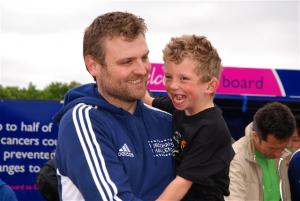
You can read more about the inspiration, the journey and the results at www.eurochampschallenge.com. You can also still donate to this worthy cause by going to www.virginmoneygiving.com/eurochampschallenge. Finally you can still follow the team on Twitter here.

